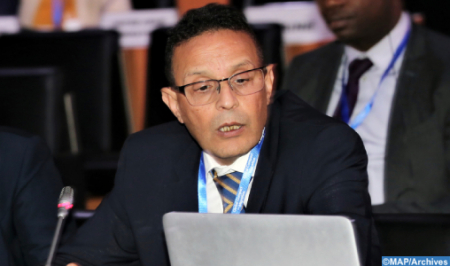AU: Morocco Pleads in Addis Ababa for Establishment of Solidarity Mechanism to Counter Malnutrition
Morocco called, Thursday in Addis Ababa, for the establishment of a solidarity mechanism according to a comprehensive and targeted approach to achieve the fight against malnutrition in the African continent. This solidarity mechanism will be able to respond to the factors of malnutrition that affect health, maternal and child care, the facilitation of services, including sanitation and distribution of drinking water, agriculture and food security, climate change with the phenomena of drought, desertification, flooding and their negative impact on the population, said the Director of Greater Maghreb and AMU and AU Affairs at the Ministry of Foreign Affairs, African Cooperation and Moroccans Abroad, Abderrazzak Laassel. This comprehensive approach depends, on the one hand, on a national and regional solution within the framework of Afro-African and South-South solidarity and, on the other hand, on the serious commitment of Africa’s partners, including the creation of a fund to fight malnutrition, said Laassel, who was speaking before the 39th session of the Executive Council of AU, whose proceedings are taking place at the headquarters of the pan-African organization in Addis Ababa. The Moroccan official, who spoke on the theme of the year 2022 “Building resilience in nutrition on the African continent to accelerate the development of human, economic and social capital”, said that Morocco welcomes the choice of this topic and congratulates the Republic of Cote d’Ivoire at the origin of this theme. The Kingdom welcomes the concept note that highlighted the current state of nutrition in Africa issue, sounding the alarm on staggering figures. Thus, the Moroccan official deplored, “it is clear that 150.8 million children under the age of 5 years suffer from stunting, 58.7 of whom live in Africa. In addition, 38 African countries have prevalence rates of anemia in women higher than 30%. “Malnutrition is also one of the causes of mortality in children under 5 years of age and at the origin of the vulnerability of adolescents and costs African countries the equivalent of 1.9 to 16.5% of their gross domestic product (GDP),” he added. This theme is timely, taking into account the difficult situation that humanity in general, and Africa in particular, is going through, following the repercussions of Covid-19, which has upset all plans and forecasts, widening the gap between rich and poor and delaying the achievement of Agenda 2063, noted Laassel.

